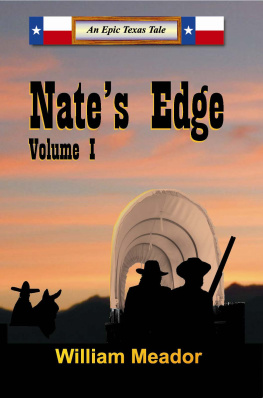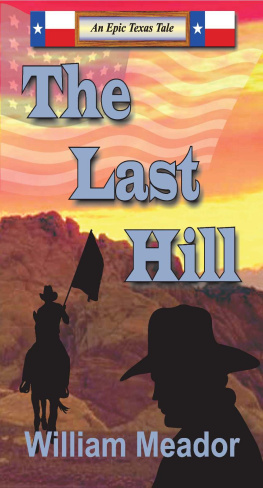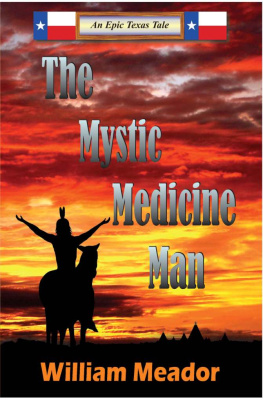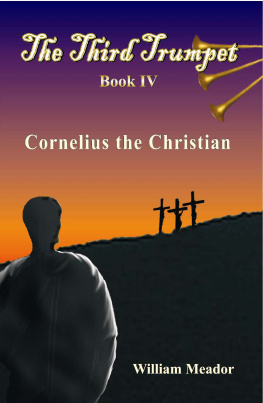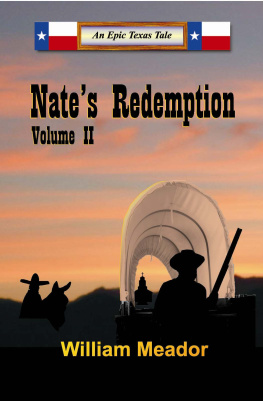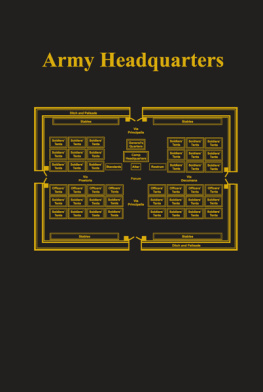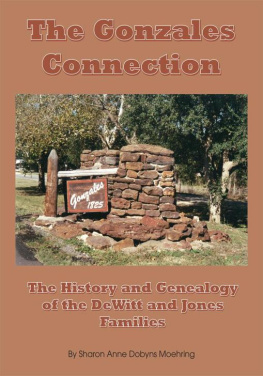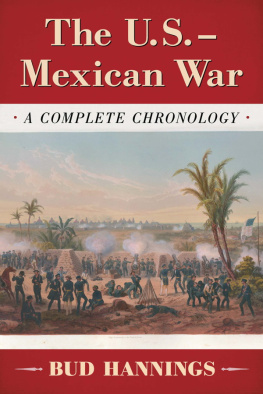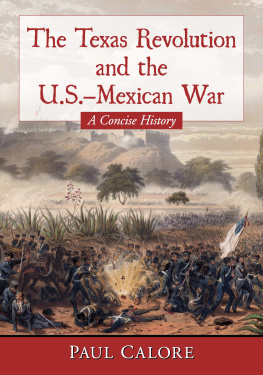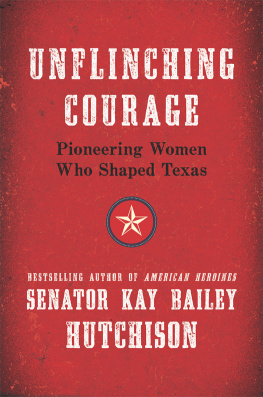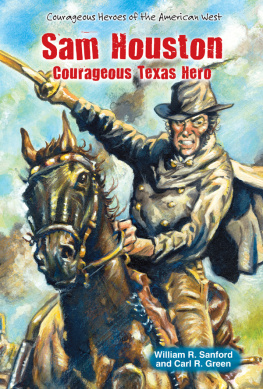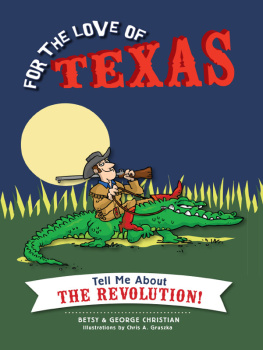NATES EDGE
William Meador
Edited by Ellen M. Hopkins
Authors Publishing House
Midland, Texas
Nates Edge
Copyright 2012 by William Meador
All rights reserved. Copying or reproducing by any mechanical, photographic, or electronic processes, or in the form of any phonographic recording, shall violate the copyright. No transmitting or copying for public or private use is allowed, other than as brief quotations embodied in articles and/or reviews, without the express written permission of the author and publisher.
ISBN-13: 978-0-9825340-6-9
Contents
Prologue
Nate Carter, a low-down, scheming, poker-playing, sorry excuse for a man, tried to steal from his own family. The family thought of him as a thief, schemer and conniver.
In school, the other kids changed the spelling of Nates name to Ante. Cruelly, they called, Ante is a fatty. Ante is a fatty. Ante is a fatty. Few family members would have anything to do with Ante, or Little Ante as the family sometimes cruelly called Nate.
The use of his initials, NC for Nate Carter, only made him angrier. Over time, his cousins picked up on the school kids chant and added many derogatory sayings. NC is nasty. NC is nasty. NC is nasty.
Nate grew into manhood with a very large chip on his shoulder and his life filled with dislike for his family.
At funerals and weddings the family shunned Nate and his wife, Pettie. Every move Nate made involved cheating or outwitting someone.
One member of the family called him, A weasel, an egg sucking skunk and a chicken stealing dog! And, that was on his good days!
Nates family, teachers, farmers, preachers, merchants and soldiers, were all good solid citizens, all but Nate. If there ever was a black sheep in a family, it was Nate Carter. Besides his label as the black sheep, Nate was not just a coward; he was a soft, white, lily-livered coward.
Nate possessed only two real skills. He was a cunning poker player and a very accurate shot with a ten-gauge shotgun.
Even with his sorry standards, Nate didnt cheat at cards and drank very little, if any. He supported his family with his card playing far more years than he supported them with farm proceeds. When backed into a corner or forced to fight, he defended himself with his ten-gauge shotgun.
Greed made Nate leave his family to chase across West Texas and the Territory of New Mexico in pursuit of two nieces and a nephew - - stealing their inheritance, which prompted his pursuit. This scheme failed, and Nate summarily was thrown out of the Territory of New Mexico.
With his expulsion from the Territory, Nate turned to full-time poker-playing. Although he never cheated, he was involved in numerous gunfights.
With the law or the Army just a step or two behind him, Nate and his gun-slinging friend, Slim, began to run.
The trail he followed led from the Territory of New Mexico across West Texas. He gambled at the Texas forts: Richardson, Belknap, Concho, Stockton and Davis.
Then, along with his new hombre, Juan Valencia, they visited most of the Mexican villages and compounds along the way. Events led them to a railroad camp, later known as Marfa and a silver mining camp, called Shafter, and down to Presidio, Texas, and across the Rio Grand to Ojinaga, Mexico.
Staying only a little ahead of the law, Nate and Juan crossed the Rio Grande, only to become involved in the escape of two gringos from a Mexican jail. Now they were wanted on both sides of the river. He and Juan were on the run.
Follow Nate as he plays poker, fights gun battles and runs to his surprise, right into the arms of the law.

1
Big drops of cold rain spattered the ground and the riders. Troop G, temporarily billeted at Fort Sumner, Territory of New Mexico, rode for a half day when the weather changed. Thunder rolled and lightning flashed from the clouds to the west. The wind whipped viciously one way and another kicking up dust and making life generally difficult for the column. The dust turned to a mixture of rain and mud. Mud balls peppered the riders and animals. Dark, black, angry clouds filled the western sky. White and green streaks in the dark clouds indicated possible hail and hard wind in the approaching front.
Captain Weatherton commanded, Company, Halt! Company, Dismount! Sergeant Fitts, see the men put on their rain gear and get ready for a blow. From the looks of those clouds we are in for a real storm.
Captain Weatherton was big, and his face was covered with a black beard, a beard as black as the approaching storm. If Captain Weatherton was any bigger, the Army would not allow him in the Cavalry. One more pound in weight would mean reassignment to other responsibilities. As it was, Captain Weatherton commanded a detail headed for Fort Richardson.
Captain Weatherton received three sets of orders to follow on this patrol:
Item 1. Escort his guest out of the Territory and to the trading post called The Tule.
Item 2. Meet drovers with a herd of horses at The Tule and drive the horses to Fort Richardson.
Item 3. Escort a wagon train of provisions from Fort Richardson back to Fort Union in the Territory.
The closing of Fort Richardson meant the delivery of the wagon train of stores, supplies and ordinance to Fort Union.
Captain Weatherton was glad to ride to The Tule and on to Fort Richardson. This patrol put him on a long ride without daily orders from his superiors. With a command of over twenty men, he could do some real commanding, at least in his eyes. His men hated him with a passion. They only followed his orders because he wore captains bars.
The Tule was another reason for looking forward to this long patrol. At The Tule, he and his men had time for women, whiskey and poker. Poker was his other weakness, besides acting like an overbearing bully. Hundreds of miles from any other officers, they could drink, gamble and womanize until they ran out of money, or the herd of horses arrived signaling the time to move on to Fort Richardson.
Captain Weatherton barked again, Sergeant, why are you standing there? Get those men moving, and see they put on their rain gear. See the weapons are protected. Move it, Mister!
Captain Weatherton rode his horse down the line and gave every man a hard inspection with his piercing, shifty, black eyes. He never met a man with a straight look. Instead, he always cut his eyes in a sly fashion.
Yes, Sir, replied Sergeant Fitts, his voice filled with venom.
He hated Captain Weatherton with a vengeance, but Weatherton was the captain, even if overbearing and a bully.
Sergeant Fitts shouted at the men in the column. All right you blue-bellied horse soldiers, you heard the man. Get those slickers on and on the double! Check all of your equipment and ensure its protected from the rain. Understand?
The troop grumbled and muttered but moved with efficiency, a trademark of the U. S. Cavalry. They also moved a little faster as Captain Weatherton rode closer.
Sergeant Fitts, a lifer in the Cavalry with a short, wiry body, made an ideal Cavalry soldier. Quick of motion, he always planned his actions and performed with ease and grace. Sergeant Fitts service stretched over twenty years, and the Army was now his home, family and life. One thing he did know. Given a little time, Captain Weatherton would make a mistake and someone would kill the overbearing captain. Otherwise, he might be demoted or kicked out of the Army. Sergeant Fitts recognized men like Weatherton from his years of experience. At least one man like Weatherton cursed every command in the service. Fitts needed to just bide his time, and he would see Weatherton busted and gone.

